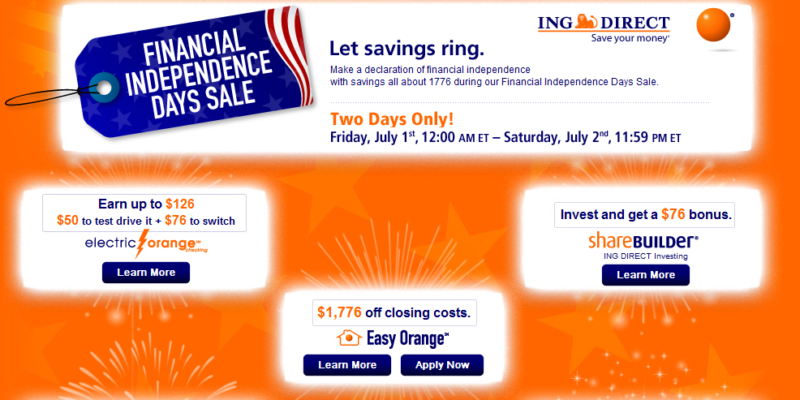What would your future-you have to say to you?
The no-pants guide to spending, saving, and thriving in the real world.
What would your future-you have to say to you?

Welcome to the Best of Money Carnival #87, the Gold Rush Edition.
On January 24th, 1848, gold was discovered in Coloma, California by construction overseer James W. Marshall. The following year, one hundred thousand people moved to California to either strike it rich, or profit from those who were trying to strike it rich. The gold rush began 163 years ago today.
10. N.W. Journey presents Business use of Home Deduction posted at Networth Journey and says, “How to deduct your business home expenses.”
Some people recommend stockpiling gold so you’ll have something of value to spend after society as we know it collapses. Does anyone know how to make change from a gold bar for a loaf of bread?
9. Darwin presents Present Value of Money Explained – MBA Monday posted at Darwin’s Money and says, “One of the most important financial concepts is also one of the most misunderstood. Make sure you understand the Present value of Money – with these real life examples. It will save you thousands!”
In 1854, a 195 pound gold nugget was found at Carson Hill in California. It was valued at $43,534. That would be worth $3,160,357.20 today.
8. RJ Weiss presents What Your Optimal Income? posted at Gen Y Wealth and says, “An exercise to find your optimal income level.”
Q: Which weighs more: a pound of feathers, or a pound of gold? A: A pound of feathers. Gold is weighed using Troy Weight, which only has 12 ounces per pound.
7. BWL presents How To Select A Financial Advisor posted at Christian Personal Finance and says, “Find out how to select the best financial adviser for you.”
Until the onset of modern electronics, which use gold because it doesn’t corrode or tarnish, gold had no practical value of its own. Its entire value resided in the fact that it was pretty and relatively scarce.
6. Miss T presents 10 Ways to $ave Energy Comfortably | Prairie EcoThrifter.com posted at Prairie Eco-Thrifter and says, “How great is it to save money and the planet at the same time?!”
Q: Which weighs more: a ounce of feathers, or a ounce of gold? A: A ounce of gold. Troy Weight has fewer ounces that avoirdupois, but each ounce weighs more. There are 31.1 grams in a Troy ounce, but only 28.4 grams in a standard ounce.
5. Craig Ford presents Employers Look at Credit Reports | Ludicrous or Smart Business? posted at Money Help For Christians and says, “Should employers be able to see your credit report?”
Outside of collectible or government-issued coins, gold is priced according to it’s spot price, which fluctuates constantly. Dealers will generally pay a percentage under spot when buying gold, then sell for a percentage over spot. Always know the spot price of gold before you agree to buy or sell any.
4. MoneyNing presents Tax Time: Do I Have to Report that Income? posted at Money Ning and says, “Did you receive any income last year? Do you really have to report everything?”
Gold is the 58th most rare natural element, out of 92.
3. Silicon Valley Blogger presents I Just Lost My Job! How I’m Downsizing My Household Expenses posted at The Digerati Life and says, “I share my story of job loss and what ideas I have for paring down my expenses in order to cope with this loss of income. In the meantime, I’m doing what I can to find a new job!”
Only 20% of the gold from the Gold Rush deposits has been reclaimed. The rest is still out there.
2. The Financial Blogger presents 5 Reasons Why You Need A Partner In Your Business posted at The Financial Blogger and says, “A post outlining the benefits of a business partner.”
As of the end of 2009, more than 160,000 tons of gold have been mined, most of which was done in the latter half of the 20th century.
And the winner is…
1. Amanda L Grossman presents Frugal Lessons from People Who Survived the Great Depression posted at Frugal Confessions – Frugal Living and says, “Have you ever met someone who was alive during the Great Depression? They are changed people. The Great Depression left a great impression on their thoughts, their styles, and their habits. I am fascinated by this time period, and researched the question of what frugal habits these people developed to survive.”
I’d like to thank everyone who participated. Next week’s host is PT Money, so don’t forget to submit your entry!

Ten years ago, I buried myself in debt. There was no catastrophic emergency or long-term unemployment, just a series of bad decisions over the course of years.
We bought a (short) series of new cars, a house full of furniture, electronics, hundreds of books and movies, and so much more. We threw a wedding on credit and financed an addition on our house. We didn’t gamble or drink it away, we just spent indiscriminately. We have a ton of stuff to show for it and a peeling credit card to prove it.
What changed?
In October 2007, we found out brat #3 was on the way. Don’t misunderstand, this was entirely intentional, but our…efficiency caught us by surprise. It took several years to get #2. We weren’t expecting #3 to happen in just a couple of weeks. #2 wasn’t even a year old when we found out she was going to be a big sister. That’s two kids in diapers and three in daycare at the same time.
The technical term for this is “Oh crap”.
I spent weeks poring over our expenses, trying to find a way to make our ends meet, or at least show up in the same zip code occasionally.
I finally made my first responsible financial decision…ever. I quit smoking. At that point, I had been smoking a pack a day or more for almost 15 years. With the latest round of we’re-going-to-raise-the-vice-tax-to-convince-people-to-drop-their-vices-then-panic-when-people-actually-drop-their-because-we-made-them-too-expensive taxes, I was spending at least $60 per week, at least.
Interesting side story: A few years ago, Wisconsin noticed how many Minnesotans were crossing the border for cheap smokes and decided to cash in by raising their cigarette taxes. The out-of-state market immediately dried up. Econ 101.
So I quit, saving $250 per month.
Our expenses grew to consume that money, which we were expecting. (Remember, we were expecting a baby!) Unfortunately, our habits didn’t change. We still bought too much, charged too much on our credit cards, and used our overdraft protection account every month. At 21% interest!
Nothing else changed for another year and a half. My wife would buy stuff I didn’t like and we’d fight about it. I’d buy stuff she didn’t like and we’d fight about it. When we weren’t arguing about it, we’d just silently spend it all as fast as we could.
Bankruptcy was looming. We had $30,000 on our credit cards and our overdraft protection account was almost maxed out. Have you ever thought you’d have to sell your house quickly?
One day, while I was researching bankruptcy attorneys, I ran across Dave Ramsey. When I got to daycare that evening to pick up the kids, I noticed they had The Total Money Makeover on the bookshelf, so I asked to borrow it.
I read the book twice, had a very frank discussion with my wife about the possibility of bankruptcy, and we set out on the path to financial freedom together.
What made you decide to handle your finances responsibly? Or, perhaps more importantly, what’s holding you back?
Last weekend, I was in Denver for the Financial Blogger Conference. Last week, I had a sore throat that got worse each day until my tonsils started touching on Friday. I could barely talk, so I went to the doctor, then to bed.
It apparently wasn’t strep throat, but beyond that, it could be anything from motaba to weaponized syphilis*.
This is one of those occasions when I’m happy to be living in the future, where a quick trip to the clinic can knock out what would have been hopeless and fatal and few hundred years ago. Antibiotics and a day spent in bed watching super hero movies made me better. That beats bloodletting any day.
Yakezie Carnival: FINCON Edition hosted by Finance Product Reviews
Carnival of Money Pros hosted by My University Money
Carnival of Retirement #36 hosted by Making Sense of Cents
Carnival of Personal Finance #377 hosted by Money Life and More
Yakezie Carnival: Labor Day Edition hosted by Stock Trend Investing
Yakezie Carnival: The Best of Summer Edition hosted by On Target Coach
Carnival of Money Pros hosted by Simple Finance Blog
Carnival of Retirement #34 hosted by My Family Finances
Lifestyle Carnival #17 hosted by The Free Financial Advisor
Yakezie Carnival: Dog Days of Summer Edition hosted by Frugal Portland
Carnival of Money Pros: Back to School Edition hosted by See Debt Run
Nerdy Finance #7 hosted by Nerd Wallet
Yakezie Carnival hosted by The College Investor
Yakezie Carnival – Rescue Edition hosted by See Debt Run
Carnival of Financial Camaraderie #45 hosted by My University Money
Carnival of Money Pros hosted by Aaron Hung
Carnival of Retirement #32 hosted by Young Family Finance
Thanks for including my posts.
You can subscribe by RSS and get the posts in your favorite news reader. I prefer Google Reader.
You can subscribe by email and get, not only the posts delivered to your inbox, but occasional giveaways and tidbits not available elsewhere.
You can ‘Like’ LRN on Facebook. Facebook gets more use than Google. It can’t hurt to see what you want where you want.
You can follow LRN on Twitter. This comes with some nearly-instant interaction.
You can send me an email, telling me what you liked, what you didn’t like, or what you’d like to see more(or less) of. I promise to reply to any email that isn’t purely spam.
This involves giving each of the syphilis spirochetes an M16 and a Manifest Destiny indoctrination before releasing them into the wild. The transport mechanism (the “insertion method”) remains as fun as ever.
Have a great weekend!
It’s not a secret that health care can be expensive. Many people pay two and three digit bills for their prescriptions. A visit to the doctor’s office can hurt the budget. Glasses cost hundreds of dollars? How can you cut this cost?
Drugs
If possible, go generic*. There is no difference between Trazorel and trazadone, aside from the cost. Wal-mart, Target, and many other stores offer common generic prescriptions for $4-5. When you are talking to your doctor, ask if there is an drug option that has an available generic. When you are talking to your pharmacist, ask if there is a generic alternative available.
Get the price match. The Cub Foods pharmacy near me matches the Target generic drug price, giving us $4 generics for the asking. This is often an unpublicized deal, so make sure you ask. If your pharmacy will not match nearby prices, consider going elsewhere.
See if there is a 90 day plan. Many insurance companies sponsor a 90 day prescription plan that gives you a 90 supply of drugs for the 60 costs as long as you are willing to accept the drugs by mail. For expensive prescriptions, this 33% discount can be a substantial savings.
Physician
Does your clinic offer online consultations with your doctor or nurses? Some clinics offer a chat or email option to talk to your doctor without requiring a visit that will add fees and copays to your expense sheet. Most clinics and hospitals have a free nurse line for basic questions, like “When is my baby‘s fever dangerous?” It’s a great chance to save some money. I know, from personal experience, that they won’t be shy if they feel you need to come in, but they generally won’t try to convince you to come in if aspirin will fix the problem.
Stay in-network. Check with your insurance company to make sure the doctor you want to see if in your network and therefore, available at the cheapest out-of-pocket price. If not, and you really want that doctor, ask your insurance company if they accept nominations for the network and ask your doctor if he’d be interested in being nominated.
Stay home for your cold. Don’t go to the doctor for every minor problem. The best remedy a doctor can give your for your cold will reduce it to a seven day malady. On the other hand, if you do nothing, it will go away in about a week. Why waste the money? This counts double for the emergency room and urgent care. Strep throat is not an emergency. Wait until morning and go to the clinic, paying the lower fees instead of the large ER costs. Make an appointment for a doctor visit, if possible. Urgent care is billed the same as a regular visit, but most insurance plans double or triple the copay for urgent care visits.
Cash Flow
A Health Savings Account(HSA) is a pre-tax account to save for qualifying medical expenses similar to a Flexible Savings Account(FSA). The main differences are that HSAs are only available for people with high-deductible insurance plans and do not have to be spent on medical expenses. Non-qualifying expenses move from pre-tax to post-tax, meaning you will be charged federal income tax for non-qualifying withdrawals. FSAs are “use it or lose it” plans. If you don’t use it, it will go away, usually at the end of the year. That makes December a great time to stock up on over-the-counter medicines and possibly replace your eyeglasses, as both of those are qualifying expenses. Find out if you have either option available. If you use either one, set aside a place to store every imaginable medical receipt, so you can be reimbursed. Make sure you understand the FSA-eligible expenses.
An Ounce of Prevention
Get routine checkups. The earlier you find a problem, the more options you have. This goes for everything from cancer screenings to blood tests. Get a physical every year and know what is happening with your body. We may be living in the future, but replacement parts are still hard to come by.
Maintain Your Health
It’s cheaper to be healthy. Eat right, exercise, quit smoking.
I enjoy a good meal. It’s one of my favorite things. I won’t cut rich foods out of my diet, so we reduced portions. Beyond the first few bites, the flavor isn’t nearly as enjoyable or even noticeable. There’s no more enjoyment for huge servings than small ones.
Get more exercise, even if it’s just a 2o minute walks twice a week parking on the far side of the parking lot, or taking the stairs instead of the elevator.
Vision
Go online. This one is worth a write-up all by itself. I have 6 pairs of prescription glasses–all varieties of frames and coatings–that have cost a grand total of about $150. There is no noticeable difference between my cheapies and the designer alternatives. While I work on the write-up, the best site to introduce you to the concept of online glasses is GlassyEyes. Reviews, coupons, and discount likes. They have step-by-step instructions on turning an intimidating idea into a simple and cheap solution to an expensive problem.
How do you save money on health care?
* There are no generics available on new drugs until the initial patent expires. This gives the pharmaceutical companies a change to recoup their research and development costs. Without this patent period, new private drug research would evaporate. Don’t hate the brand names, but don’t show undue loyalty.


I just got an email from INGDirect. To celebrate Independence Day, they are having a sweet, sweet sale.
You can:
Take advantage of all of that and you’ll get $2054 in cash or discounts.
Seriously, this deal rocks. If you don’t have an INGDirect account, get one. There are no overdraft fees and no monthly fees.
The sale ends tomorrow at midnight, so hurry.